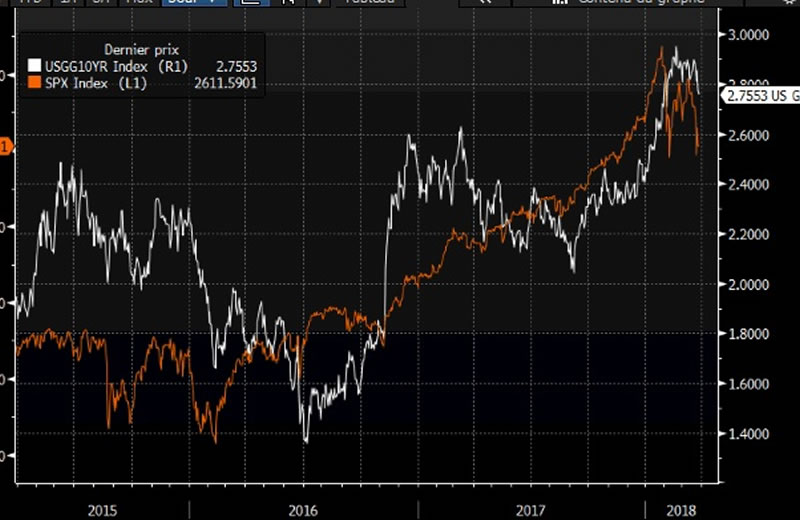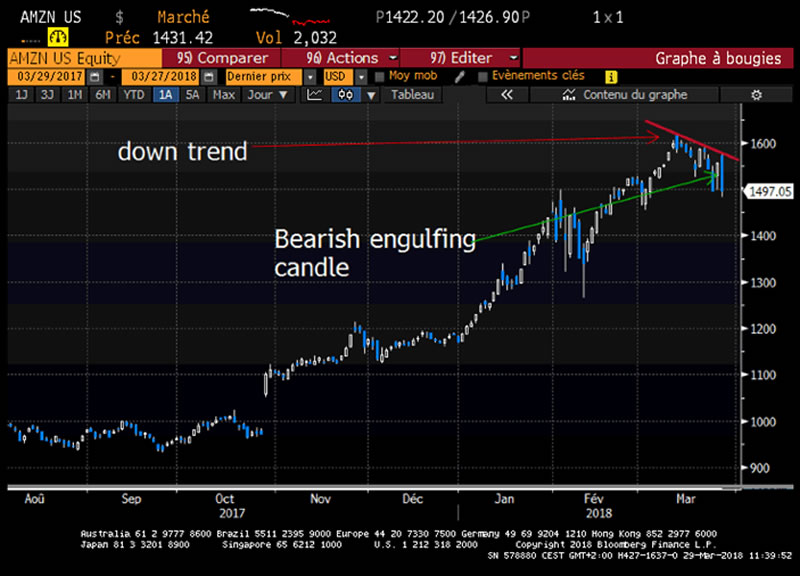Sketchy Explanations For Stock Market Selling
Stock-Markets / Stock Markets 2018 Mar 29, 2018 - 05:50 PM GMTBy: WMA
 Each time equity markets enter a corrective phase, the financial media has to find “the reason”. Without knowing “the reason” for selling, their articles would be too short and uninteresting. We posit that equity markets today are driven by animal spirits, with little regard to factors supposedly driving equity market moves. Even in “normal times” (which would not qualify this market), technicians would tell you that news follows the market. In other words, once a price trend is in place, subsequent news events are interpreted to support or explain what is already happening on markets.
Each time equity markets enter a corrective phase, the financial media has to find “the reason”. Without knowing “the reason” for selling, their articles would be too short and uninteresting. We posit that equity markets today are driven by animal spirits, with little regard to factors supposedly driving equity market moves. Even in “normal times” (which would not qualify this market), technicians would tell you that news follows the market. In other words, once a price trend is in place, subsequent news events are interpreted to support or explain what is already happening on markets.
The market turbulence since the end of January has been attributed to several factors by financial media: rising interest rates, the potential for a trade war, and calls from Washington to tighten regulation of the technology sector. The problem is that all of these factors have had a very ambiguous effect on the direction of equity indexes going back to the beginning of the Trump rally in 2016.
First, conventional wisdom is that rising interest rates are bad for equities. Readers have certainly heard all the warnings about what will happen when the U.S. 10-Year yield gets above 3%. But consider this. We looked at the worse daily drops this year in the S&P 500 and compared the equity market daily percent decline to the change in the 10-year T-Note rate.
Date |
S&P 500 % change |
10-Year T-Note yield point change |
February 2, 2018 |
-2.12% |
0.0515 |
February 5, 2018 |
-4.10% |
-0.1355 |
February 8, 2018 |
-3.75% |
-0.0119 |
March 22, 2018 |
-2.52% |
-0.0586 |
March 23, 2018 |
-2.10% |
-0.0109 |
March 27, 2018 |
-1.73% |
-0.0767 |
It’s not clear to us that rising rates are causing the equity market sell-offs. What seems like a more logical reflection is to recognize that money must go somewhere. If money leaves equities, it goes mostly into bonds, pushing rates down. So, in fact, rising rates pull money out of Treasurys and into stocks until rates get too high (or rather too “attractive”) for bond investors who then jump on any news event to buy “safe haven” Treasurys and sell provisory stock holdings. Appropriately enough, since 2015, looking at the S&P 500 index (red line) versus the 10-year rate (white line) we observe a generally positive correlation between equities and rates (implying a traditional, negative correlation between equities and bonds).

Next explanation for the recent selling: Trump’s promised trade tariffs. It’s hard to believe that something the market has know about since the Presidential campaign in 2016 suddenly will be the reason the market corrects. Of course equities indexes rallied in early March, even as tariffs were being discussed. We’ll say that markets were credulous and needed to see Donald Trump’s signature on the Executive Order before selling began. So fears of a trade war with China are more serious than fears of nuclear war with North Korea? Really? If markets continue to fall and the media cites a trade war with China as the reason, we’ll chalk it up to a “spurious correlation”. In the end, it’s more likely that Trump, another of the book “The Art of The Deal”, is using his “negotiation skills” in using tariffs as leverage prior to trade negotiations with China.
Okay, surely the Facebook debacle and threats by Trump to change tax treatment of Amazon were the cause of the sell-off in all technology stocks. More regulation of the technology sector is a bad thing. Or…maybe these news events just triggered movements already setting up on the Facebook and Amazon price charts. The chart below is that of Amazon, truncated to the day before (March 27) Trump tweeted about taxing Amazon internet sales. Gee, where do you think the Amazon price was headed? It’s curious that the equity markets rallied throughout 2017 because Trump was the “de-regulation”, pro-business president, then the 2018 sell-off is now attributed to Trump imposing un-business friendly regulations. Who buys this waffle out of the media?

Conclusion
Trading news events will give you whiplash, buying high then selling low. Listening to the “talking heads” parading on financial media networks telling you the greatest risk to your equity portfolio are rising interest rates will destroy your portfolio value. One of the keys to success is tuning out the noise coming from the media and financial market pundits, who purport that reason X or reason Y will be the trigger to provoke an equity bear market. No one knows when, nor what event (likely a black swan in our opinion), will end the bull market definitively. In general, if a news item is known to the public, markets have priced the news into stock prices. It is said that “it’s not the snake that you see which bites you”.
Our Top Picks Strategy does not buy/sell on news events. Rather we remain fully invested in a portfolio of companies whose fundamental scores in all of our categories (earning/revenue growth, valuation, profitability, P/E, PEG, financial situation, earnings revisions, RoE, analyst consensus recommendations, etc) rank near the top of our 4,000+ company universe. Instead of trying to out-guess all the wiggles in equity prices provoked by financial media news, a more robust approach to long-term capital appreciation is to avoid trading your portfolio on sketchy explanations for equity market movements.
By Williams Market Analytics
http://www.williamsmarketanalytics.com
We provide insightful market analysis and account management founded upon our very successful systematic, disciplined approach to investing. Our investment analysis revolves around two inputs: company valuation and our quantitative, market-based indicators. Learn more about our approach and our strategist.
© 2018 Copyright Williams Market Analytics - All Rights Reserved
Disclaimer: The above is a matter of opinion provided for general information purposes only and is not intended as investment advice. Information and analysis above are derived from sources and utilising methods believed to be reliable, but we cannot accept responsibility for any losses you may incur as a result of this analysis. Individuals should consult with their personal financial advisors.
© 2005-2022 http://www.MarketOracle.co.uk - The Market Oracle is a FREE Daily Financial Markets Analysis & Forecasting online publication.



